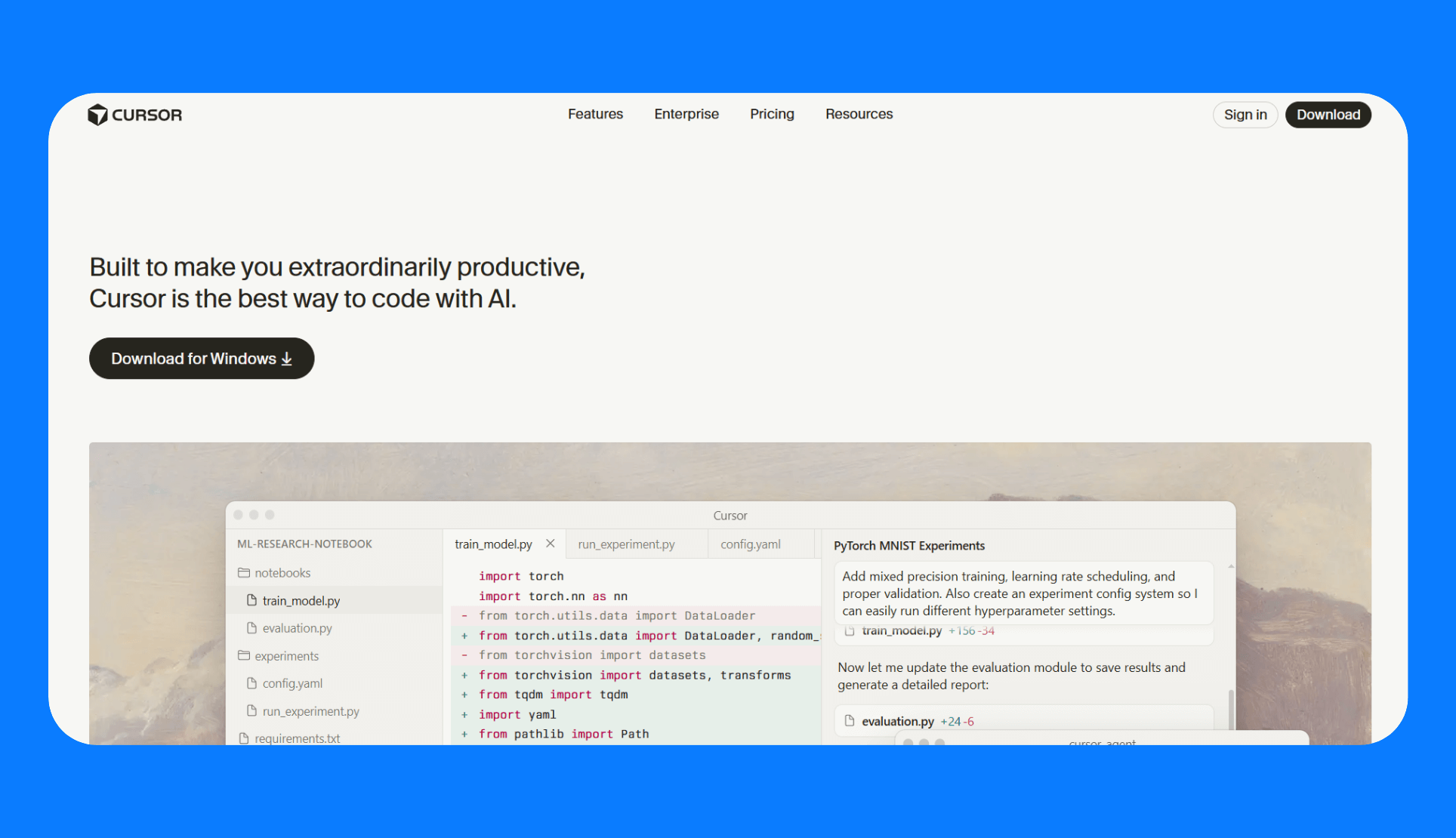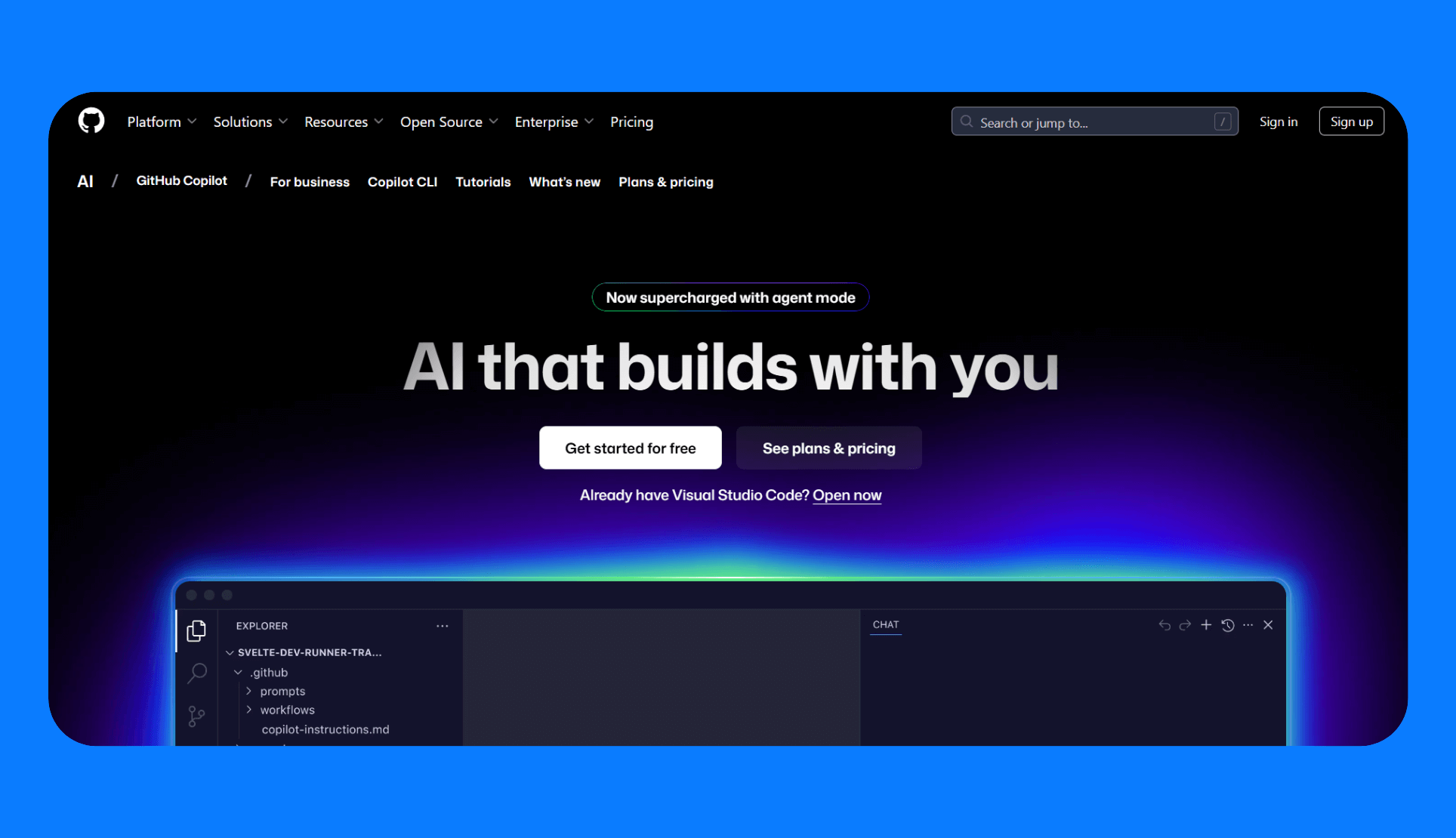


Cursor and GitHub Copilot are code-level assistants that speed up your coding workflow inside your IDE. Clark, by contrast, is Superblocks’ AI agent for building enterprise internal apps. It outputs complete apps while enforcing enterprise governance and security standards.
In this article, we’ll discuss:
- Key features of Cursor, GitHub Copilot, and Clark
- How much these tools cost
- When to use each
Cursor vs GitHub Copilot vs Clark: TL;DR
Cursor is a standalone AI code editor, and GitHub Copilot is a coding assistant that integrates into many IDEs. Clark from Superblocks generates full-stack internal apps from natural language prompts.
Here’s how these three tools compare:
Both Cursor and Copilot increase developer productivity as they write and edit code, though some features may be more effective in Cursor depending on language and project size. They’re general-purpose assistants and assist with whatever tech stack or project you’re building.
Clark focuses on internal tool development. It can complement Cursor or Copilot. You can export your AI-generated apps from Superblocks and edit them in Cursor or an IDE in which you’ve installed Copilot.
Cursor

What it does: Cursor is a popular AI code editor for developers. It can predict your next code edits, answer questions about your codebase, and apply natural-language instructions to modify code across your codebase.
Who it’s for: Developers who want an AI pair programmer that’s tightly woven into their coding environment and don’t mind switching editors.
Key features
- Agent, ask, and manual mode: The agent mode can independently search your codebase, generate or edit files, and run terminal commands. The manual mode makes targeted changes to the files you specify. The ask mode is a read-only mode that answers questions about your codebase.
- AI code completion: Cursor’s Tab feature provides intelligent code autocompletions that can span multiple lines or entire code blocks.
- Codebase knowledge and search: Cursor starts automatically indexing your codebase when you open a project. You can ask questions about your project and get answers with references.
- Background agents: These agents complete coding tasks end-to-end without ongoing supervision.
Pros
- You can use Cursor’s background agents to write code for a task, commit the changes, and create a pull request.
- MCP servers connect Cursor to external systems like Google Drive and Notion to bring your data into your coding workflows.
- Cursor is a fork of VS Code. All your muscle memory for shortcuts and the rich extension library carry over.
- Cursor’s agent can run in the terminal. If you’re using Neovim, JetBrains, or other IDEs, you can still use it.
- The Privacy Mode makes sure that code data isn’t stored by model providers or used for training.
Cons
- Cursor’s Pro plan is double the price of Copilot ($20 vs $10 per month).
- Background agents don't work in privacy mode, so there's that tradeoff.
- Indexing and responsiveness can be slow on large repositories.
Pricing
Cursor offers a free Hobby plan for individuals to try out with limited daily completions and a 2-week trial of Pro features.
Individual plans start at $20/month and offer unlimited autocompletions and higher limits on agent requests. Teams can opt for a Teams plan at $40/user/month for organization-wide settings and SSO.
Bottom line
Cursor is one of the most capable agentic IDEs right now, if you want an AI‑first code editor.
GitHub Copilot

What it does: GitHub Copilot is an AI coding assistant that plugs into your existing code editor. It analyzes the code and context around your cursor to suggest the next line, function, or code block as you type. It also has an agent that can run tasks autonomously.
Who it’s for: Copilot is designed for developers who want integrated AI assistance in their workflow. It works in Visual Studio Code, Visual Studio, JetBrains IDEs, Neovim, the command line, and the GitHub website.
Key features
- Inline code suggestions: Copilot suggests entire lines, functions, or code blocks in real-time as you write.
- Copilot chat: The chat interface lets you ask questions, get code explanations, generate tests, or request bug fixes directly in the IDE.
- Multi-platform support: Copilot works across major editors and integrates with the GitHub ecosystem for code review, code search, and repository management.
- Agent mode: Copilot's agent mode can autonomously make code changes, run tests, fix issues, and propose changes across multiple files, using pull requests for review.
Pros
- Copilot works in your existing tools. The setup is as simple as installing an extension and authenticating with your GitHub account.
- Copilot Pro offers good value at $10 per month for individuals.
- It has an option to filter out suggestions that match public code on GitHub.
Cons
- Copilot has limited context awareness for large codebases.
- You can’t attach images or screenshots to the chat.
Pricing
Copilot has a free plan for individuals that includes 50 AI chat or agent requests per month and 2,000 code completions per month. Individual plans start at $10 per month for unlimited tab completions and access to agent mode. Copilot for Business starts at $19 per user per month.
Bottom line
GitHub Copilot is widely adopted, well-integrated, and continues to improve. Given its low cost and high utility, Copilot is often the first recommendation for someone looking to try AI-assisted development.
Clark by Superblocks

What it does: Clark is Superblock’s AI agent for generating internal applications that meet your enterprise standards out of the box. It works within your company’s design system, integrations, permissions, and other policies to enforce consistency automatically.
Who it’s for: Enterprises that want to democratize AI internal app development across business and engineering teams safely.
Key features
- AI generation within enterprise standards: Clark uses your reusable components, theme, and brand assets. Apps that your team generates match your enterprise standards.
- Enterprise data and API: Clark leverages Superblocks integrations. You can connect to any database or API using the 60+ native integrations or custom APIs.
- Multi-modal editing: Clark generates 90% of your application. From there, you can edit it with the WYSIWYG visual editor or pull the generated code into your IDE (VS Code, Cursor, etc.) to tweak or extend it. Changes will sync back to the visual builder.
- Enterprise governance and admin controls: Clark benefits from Superblocks’ governance layer. You can secure access using SSO and RBAC, keep audit logs, stream events into your observability tools, or connect to production data inside your VPC.
Pros
- Clark increases development velocity 10× for internal apps compared to traditional workflows.
- It prevents shadow IT by keeping all data access, UI generation, and integration within IT governance.
- It unites engineering and business teams, as any team member can generate a functional app through a prompt and a few clicks.
- Clark readily connects with the systems your company already uses.
Cons
- Clark specializes in internal enterprise apps. It's not for public-facing apps.
- It’s still in beta.
Pricing
Superblocks uses custom pricing based on the number of creator seats, end-user counts, and your deployment preferences (cloud or hybrid)
Bottom line
Use Clark if you’re an enterprise facing constant demand for new internal tools. It allows your domain experts to generate production-ready internal apps without waiting on engineering backlog.
Feature comparison: Cursor vs Copilot vs Clark
Let’s compare Cursor, Copilot, and Clark across these key features.
Ease of use
Cursor feels natural if you’re coming from VS Code because it preserves your extensions and shortcuts. You still have to commit to using a new editor.
Copilot is the easiest to get started with. You install it directly into the IDE you already use, whether that’s VS Code, JetBrains, or Visual Studio.
Clark is straightforward to use since it's a prompt to an app builder. You don't have to touch code.
Winner: Clark
Coding assistance quality
Cursor’s quality is great for multi-line and context-heavy suggestions. It also produces more extensive diffs when you prompt it to edit code, like refactor suggestions that change many lines at once. Occasionally, the breadth of changes might include errors or oversights that you need to catch.
Copilot produces code snippets and boilerplate quickly, but it struggles with multi-file changes or complex logic.
Clark generates entire applications. I’d assess the quality here in terms of completeness, correctness to the spec, and adherence to standards. The front-end design is constrained by your component library, which is good for consistency. It uses your sanctioned APIs, integrations, and data sources. You can also define best practices that it must follow.
Winner: Clark for app generation and Cursor for code editing
Enterprise governance and compliance
Cursor has some enterprise-oriented features like Privacy Mode (to ensure no code is stored remotely) and is SOC 2 certified, which ticks compliance checkboxes. It also offers enterprise SSO and team management in its higher plans.
Copilot doesn’t enforce any particular governance on the code it generates. It’s up to you to comply with standards. However, Copilot for Business and Enterprise offers some privacy guarantees. Your code stays private. Models don’t train on it, and there’s an option to not use public code suggestion. An admin can also disable Copilot for certain teams.
Clark automatically applies your RBAC, SSO, and audit logging policies to every app it generates. You can also still keep your data on-prem.
Winner: Clark
Integration with IDEs and platforms
Cursor can integrate with Git and thereby GitHub, GitLab, and Bitbucket for source control. Its MCP protocol links external tools like Notion and Google Drive, and its agent works across Slack, the web, and the terminal.
Copilot covers the widest set of IDEs, including VS Code, JetBrains, Visual Studio, Neovim, and Xcode, through community plugins. It also integrates with GitHub.com, Codespaces, and the terminal.
Clark connects to enterprise platforms, APIs, and databases. It doesn’t integrate with IDEs directly. However, you can export the app it generates to your IDE of choice and keep working there.
Winner: Copilot for IDE coverage and Clark for enterprise integrations
Pricing
Cursor costs nearly double at $20 for Pro and $40 for Teams.
Copilot is the cheapest option $10 per month and $19/user for business.
Clark by Superblocks uses custom pricing, so costs vary by deployment.
For individuals or small teams, Copilot and Cursor are the more affordable choices. For enterprises that need secure AI apps, Superblocks' pricing is justified.
Winner: Copilot for affordability and Clark for enterprise scale.
Scalability
Cursor scales developer productivity. It can index massive repositories and update them incrementally, enabling cross-file suggestions and codebase Q&A. Enterprises can onboard hundreds or thousands of developers with SCIM provisioning.
Copilot also scales linearly across teams. Like Cursor, it indexes large repos to provide contextual suggestions, though its context window is narrower. Admins can manage access for teams and individuals across the enterprise.
Clark leverages Superblock’s governance layer to provide unified visibility across all the apps users are building on the platform. The apps deploy to global edge caches for fast performance. Clark also enforces coding and security best practices that make it easier to scale app generation consistently across large teams without creating risk or drift.
Winner: Cursor for scaling developer productivity on huge codebases, Clark for scaling production apps safely across the enterprise.
Which should you choose?
For developers, Copilot and Cursor are good options. Copilot is more accessible budget-wise for individuals.
For enterprise teams, Clark is the stronger choice when they want to empower business users to build and ship internal tools.
If your organization spans both use cases, you might end up with Clark for generating internal apps and Copilot or Cursor for editing them and building external apps.
Here are some specific scenarios when to go with each:
- Choose Clark if you’re a company where operations or support teams keep asking for custom dashboards, admin panels, reporting tools, etc., and you want to enable those teams to build solutions themselves within IT’s visibility and controls.
- Choose Cursor if you’re building new projects and want an AI-powered workflow, or working in a large codebase and need help understanding it.
- Choose Copilot if you work in one of the supported IDEs and want AI help without switching tools.
When to avoid each:
- Avoid Copilot and Cursor if you expect them to build whole apps or do high-level product design.
- Avoid Clark if you want an AI to build a customer-facing app or mobile app.
Build secure, governed internal apps with Superblocks
Clark works within your design, coding, and governance boundaries. Regardless of who on your team is building apps, you have peace of mind that they’re adhering to your enterprise standards.
We’ve looked at the key features that enable this, but just to quickly recap:
- Flexible development modalities: Teams can use Clark to generate apps from prompts, the WYSIWYG drag-and-drop editor, or code. Superblocks syncs the changes you make in code and the visual editor.
- AI guardrails: Every app built with Clark abides by organizational standards for data security, permissions, and compliance. This addresses the major LLM risks of ungoverned shadow AI app generation.
- Centrally managed governance layer: It supports granular access controls with RBAC, SSO, and audit logs, all centrally governed from a single pane of glass across all users. It also integrates with secret managers for safe credentials management.
- Keep data on prem: It has an on-prem agent you can deploy within your VPC to keep sensitive data in-network.
- Extensive integrations: It can integrate with any API or databases. These integrations include your SDLC processes, like Git workflows and CI/CD pipelines.
Ready for fast, secure internal tool generation? Book a demo with one of our product experts.
Frequently asked questions
What’s the biggest difference between Cursor and GitHub Copilot?
The biggest difference is that Cursor is a full-fledged code editor with AI features, whereas GitHub Copilot is an extension that plugs into your existing code editor.
How much does GitHub Copilot cost?
The starting price for individuals is $10/month per developer and $19/month per seat for businesses. Students, teachers, and verified open source maintainers can get Copilot for free.
Does Cursor support GitHub integration?
Yes, Cursor supports GitHub integration. You can connect to your GitHub repositories, pull and push code, create branches, and review diffs from Cursor’s interface.
What makes Clark different from Cursor and Copilot?
Clark generates entire applications from prompts, whereas Cursor and Copilot help you write code. It’s aimed at enterprises needing internal tools. Cursor and Copilot are tools for developers working at the code level.
Is there a free alternative to GitHub Copilot?
Yes, there are several free or open-source alternatives to Copilot, like Continue and Augment, when used with open-source LLM models.
Which AI coding assistant is best for enterprises?
Clark is the best AI coding assistant for enterprises because it offers the governance and security features enterprises need to manage shadow AI risks.
Which tool is best for individual developers?
GitHub Copilot is best for individual developers because it's affordable and integrates with the tools you likely already use.
Is Copilot better than ChatGPT?
Copilot is better than ChatGPT for hands-on coding and productivity inside the editor. ChatGPT is better if you want conversational guidance, explanations, or multi-step code workflows outside your IDE.
Stay tuned for updates
Get the latest Superblocks news and internal tooling market insights.
Request early access
Step 1 of 2
Request early access
Step 2 of 2
You’ve been added to the waitlist!
Book a demo to skip the waitlist
Thank you for your interest!
A member of our team will be in touch soon to schedule a demo.
Table of Contents



.png)
.png)
%20(1).png)